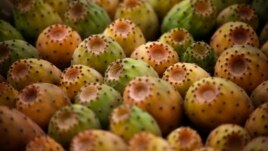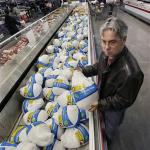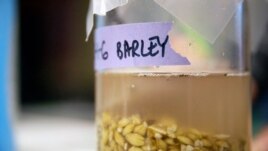From VOA Learning English, this is the Health & Lifestyle report.
这里是美国之音慢速英语健康和生活报道。
In the future, chemicals from plants found in and around the Mediterranean may be used to help treat people with brain diseases such as Alzheimer's and Parkinson's.
来自地中海及其周边发现植物中的化学物质未来可用于帮助治疗患有阿尔茨海默病和帕金森病等脑部疾病的患者。
These two diseases are age-related and neurodegenerative. Neurodegenerative relates to the degeneration of nervous tissue, especially the brain.
这两种疾病都和年龄相关,属于神经退行性疾病。神经退行性疾病同神经组织、特别是脑部的退化存在关联。
People suffering from Alzheimer's and Parkinson's have deposits of sticky plaque in their brains. Over time, this plaque reduces brain function. Eventually, it causes death.
阿尔茨海默病和帕金森病患者的脑部都有粘性斑块的沉积物。随着时间的推移,这种斑块会降低大脑功能,并最终导致死亡。
Scientists say plaque can be reduced
科学家称可以减少斑块
But scientists say the plaque deposits can be reduced with chemicals from plants, including prickly pear and brown seaweed. Scientists say the chemicals — or, extracts — appear to replace the harmful, sticky plaque with deposits that are less harmful.
但是科学家表示,这种斑块沉积物可以通过从包括仙人球和褐藻在内的植物中提取的化学物质来减少。这些化学物质或提取物似乎可以用危害较轻的沉积物来替换这些有害的粘性斑块。
These scientists are researchers at the University of Malta and the National Center of Scientific Research at the University of Bordeaux.
这些科学家是来自马耳他大学以及波尔多大学国家科学研究中心的研究人员。
They tested the chemical extracts of the plants on a substance called Brewer's yeast. This yeast had plaque deposits similar to those seen in Alzheimer's disease. Scientists say the health of the yeast improved greatly after exposure to the chemical extracts.
他们用一种被称之为布鲁尔氏酵母的物质测试了这种化学提取物。这种酵母具有类似于阿尔茨海默病中观察到的斑块沉积物。科学家说,在接触到这种化学提取物之后,这种酵母的健康大有改善。
Researchers then tested the extracts in fruit flies that were genetically changed to develop symptoms of Alzheimer's.
研究人员然后用经过基因修饰出现了阿尔茨海默病症状的果蝇测试了这种提取物。
They found that when the flies were given brown seaweed extract, their lifespans increased by two days. Prickly pear helped the insects live four days longer.
他们发现,当这种果蝇被应用褐藻提取物时,它们的寿命延长了两天。仙人球(提取物)帮助这种昆虫多活了四天。
That may not sound like a long time. However, the researchers remind us that one day in the life of a fruit fly is equal to one human year.
这听起来可能不算太长时间。然而,研究人员提醒我们,果蝇寿命中的一天相当于人类的一年。
Researchers also noted that movement in some diseased insects improved.
研究人员还指出,一些患病昆虫的运动有所改善。
They reported their findings in the journal Neuroscience Letters.
他们在《神经科学快报》杂志上发表了他们的研究结果。
The best way to fight neurodegenerative diseases
抗击神经退行性疾病的最佳途径
Researchers say that the sticky plaques in both Alzheimer's and Parkinson's diseases appear to form through the same biological pathways. Targeting these pathways, they say, is the best way to fight the diseases.
研究人员表示,阿尔茨海默病和帕金森病的粘性斑块似乎都是通过同一种生物学途径形成的,针对这些途径是抗击这种疾病的最好办法。
The lead author of the study is Ruben Cauchi of the University of Malta's Center for Molecular Medicine and Biobanking. He says the Mediterranean plant extracts are already used in health foods and some cosmetics. So, they are very safe.
这项研究的主要作者是马耳他大学医学和生物银行中心的鲁宾·考基(Ruben Cauchi)。他说,地中海植物提取物已经被用于保健食品和一些化妆品,所以它们都很安全。
The research team is working with a company that extracts the chemicals for commercial use as so-called "fountain of youth" products.
该研究团队正同一家提取这种化学物质用于商业用途制造“年轻之泉”产品的公司合作。
And that's the Health & Lifestyle report.
以上就是本期美国之音慢速英语健康和生活报道。
I'm Anna Matteo.
我是安娜·马特奥。(51VOA.COM对本文翻译保留全部权利,未经授权请勿转载,违者必究!)
By Anna Matteo20 February, 2017
From VOA Learning English, this is the Health & Lifestyle report.
In the future, chemicals from plants found in and around the Mediterranean may be used to help treat people with brain diseases such as Alzheimer's and Parkinson's.
These two diseases are age-related and neurodegenerative. Neurodegenerative relates to the degeneration of nervous tissue, especially the brain.
 Prickly pears are displayed for sale at a stall in Beirut, Lebanon, July 22, 2014. A dozen prickly pears are sold for approximately $4 in the Lebanese market.
Prickly pears are displayed for sale at a stall in Beirut, Lebanon, July 22, 2014. A dozen prickly pears are sold for approximately $4 in the Lebanese market.People suffering from Alzheimer's and Parkinson's have deposits of sticky plaque in their brains. Over time, this plaque reduces brain function. Eventually, it causes death.
Scientists say plaque can be reduced
But scientists say the plaque deposits can be reduced with chemicals from plants, including prickly pear and brown seaweed. Scientists say the chemicals — or, extracts — appear to replace the harmful, sticky plaque with deposits that are less harmful.
These scientists are researchers at the University of Malta and the National Center of Scientific Research at the University of Bordeaux.
They tested the chemical extracts of the plants on a substance called Brewer's yeast. This yeast had plaque deposits similar to those seen in Alzheimer's disease. Scientists say the health of the yeast improved greatly after exposure to the chemical extracts.
Researchers then tested the extracts in fruit flies that were genetically changed to develop symptoms of Alzheimer's.
They found that when the flies were given brown seaweed extract, their lifespans increased by two days. Prickly pear helped the insects live four days longer.
That may not sound like a long time. However, the researchers remind us that one day in the life of a fruit fly is equal to one human year.
Researchers also noted that movement in some diseased insects improved.
They reported their findings in the journal Neuroscience Letters.
The best way to fight neurodegenerative diseases
Researchers say that the sticky plaques in both Alzheimer's and Parkinson's diseases appear to form through the same biological pathways. Targeting these pathways, they say, is the best way to fight the diseases.
The lead author of the study is Ruben Cauchi of the University of Malta's Center for Molecular Medicine and Biobanking. He says the Mediterranean plant extracts are already used in health foods and some cosmetics. So, they are very safe.
The research team is working with a company that extracts the chemicals for commercial use as so-called "fountain of youth" products.
And that's the Health & Lifestyle report.
I'm Anna Matteo.
Jessica Berman wrote this report for VOA News. Anna Matteo adapted it for Learning English. Kelly Jean Kelly was the editor.
Check your understanding of the story by taking this reading quiz.
_
Words in This Story
neurodegenerative – adj. relating to or marked by degeneration of nervous tissue
degeneration – n. deterioration of a tissue or an organ in which its function is diminished or its structure is impaired
extract – n. a substance that you get from something by using a machine or chemicals
deposit – n. an amount of something (such as sand, snow, or mud) that has formed or been left on a surface or area over a period of time
Brewer's yeast – n. a yeast used or suitable for use in brewing; also : the dried ground-up cells of such a yeast used as a source of the vitamin B complex
plaque – n. medical : a change in brain tissue that occurs in Alzheimer's disease : medical : a harmful material that can form in arteries and be a cause of heart disease
exposure – n. the fact or condition of being affected by something or experiencing something : the condition of being exposed to something
extract – v. to get (a substance) from something by the use of a machine or chemicals











